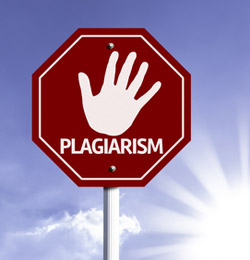Plagiarism has constantly concerned educators and managers, who need students' work to represent their particular deliberations and to reflect the conclusions of their learning. Although, with the coming of the Internet and simple access to material on every possible subject, suspicion of student counterfeiting has started to influence educators at all levels, on occasion redirecting them from the work of creating students' composition, perusing, and basic deduction capacities.

Plagiarism in Writing
This announcement reacts to the instructive worries about written falsification in four courses by characterizing copyright infringement and by proposing a percentage of the reasons for unoriginality. It also reacts by proposing a set of responsibilities (for students, instructors, and managers) to address the issue of Plagiarism, and by prescribing a set of practices for showing and discovering that can essentially diminish the likelihood of counterfeiting. The announcement is proposed to give supportive proposals and elucidations so that teachers, managers, and students can cooperate all the more adequately in backing of brilliance in showing and learning.
In instructional settings, copyright infringement is a multifaceted and morally perplexing issue. Notwithstanding, if any meaning of Plagiarism is to be useful to chairmen, employees, and students, it needs to be as straightforward and steer as could reasonably be expected inside the setting for which it is proposed. In an instructional setting, counterfeiting happens when an essayist deliberately utilizes another person's dialect, thoughts, or other unique (not regular learning) material without acknowledging its source. This definition applies to messages distributed in print or on-line, to compositions, and to the work of other student essayists.
Most present dialogs of counterfeiting neglect to recognize:
1. Submitting another person's content as one or endeavoring to smudge the line between one thought or words and those acquired from an alternate source, and
2. Carelessly referring to thoughts and words acquired from an alternate source.
Such examinations conflate Plagiarism with the abuse of sources.
Moral journalists endeavor to recognize sources completely and suitably as per the settings and types of their written work. An student who endeavors (regardless of the possibility that bumblingly) to distinguish and credit his or her source, yet who abuses a particular reference organization or erroneously utilizes quotation imprints or different manifestations of recognizing material taken from different sources, has not counterfeited. Rather, such a student ought to be considered to have neglected to refer to and report sources appropriately.
Students who are completely mindful that their activities constitute counterfeiting for instance, duplicating published data into a paper without source attribution with the end goal of asserting the information as their own, or turning in material composed by an alternate student are liable of scholarly misconducts. Although no reason will decrease the break of moral direct that such conduct represents, understanding why students steal can help instructors to consider how to diminish the opportunities for copyright infringement in their classrooms.
Students may fear disappointment or alarm going out on a limb in their particular work. They may have poor time-administration aptitudes, or they may arrange defectively for the time and exertion needed for exploration based composition, and accept they have no decision however to plagiarize. They may see the course, the task, and the traditions of scholarly documentation or the outcomes of conning as irrelevant.
Teachers may give students assignments so nonexclusive or particularized that students may accept they are defended in searching for canned reactions. Instructors and organizations may neglect to report swindling when it does happen, or may not authorize proper punishments.
Students are not blameworthy of counterfeiting when they attempt to recognize others' work yet neglect to do so precisely or completely. These disappointments are largely the consequence of disappointments in earlier showing and learning: students fail to offer the information of and capacity to utilize the traditions of authorial attribution.
What Are Our Shared Responsibilities?
Students ought to comprehend research assignments as circumstances for veritable and thorough inquiry and learning. Such a comprehension includes:
- Assembling and investigating a set of sources that they have themselves decided are applicable to the issues they are exploring
- Acknowledging unmistakably when and how they are drawing on the thoughts or phrasings of others
- Learning the traditions for referring to reports and recognizing sources proper to the field they are contemplating
- Consulting educators when unsure of how to recognize the commitments of others to thought